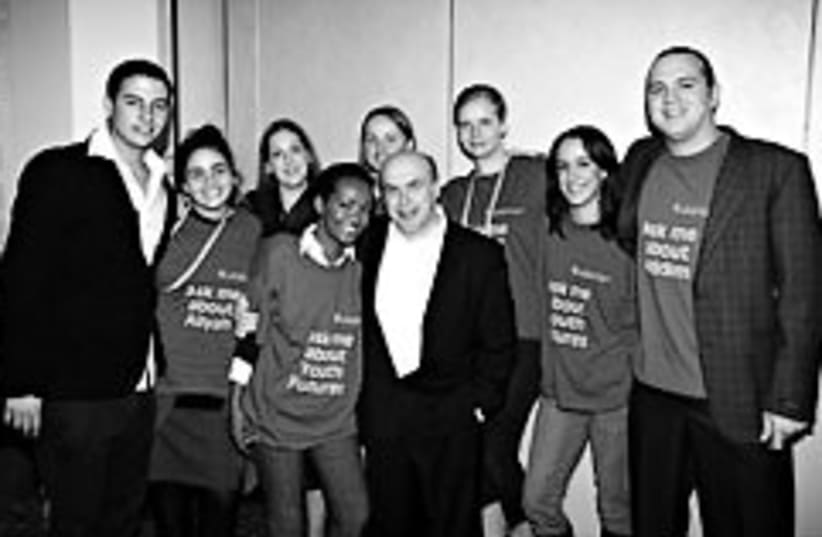New sense of urgency emerges at GA
By E.B. SOLOMONT, JPOST CORRESPONDENT IN WASHINGTON
Taking cues from his retail past, Jerry Silverman, the new head of the Jewish Federations of North America, brought a secret weapon to this year's General Assembly gathering in Washington: mystery shoppers.
With an eye to reimagining - and improving - the annual gathering of Jewish leaders, Silverman dispatched half a dozen individuals who quietly mingled among conference attendees to gauge their satisfaction and glean fresh ideas.
"When I used to run Stride Rite and we had a lot of stores, we used to hire companies that literally went in with a mom and a child, and would go in and shop and evaluate the shopping experience for us so that we could get real life information," Silverman told The Jerusalem Post. "Information creates knowledge. We believe that we have an opportunity to really evolve and grow the GA significantly over the next couple of years and so we want to do it based on real data points, real feedback and information."
In addition to standard evaluation methods like Internet surveys, evaluators quietly interviewed GA participants in order to gauge their perspectives, not unlike mystery shoppers sent to evaluate restaurants, hotels and stores. The five "completely independent" individuals, who are active in their Jewish communities and worked on a pro bono basis, were discreet: "Because they're people active in the Jewish community, all they had to do was go up to people and say hello," Silverman said. "They didn't know necessarily that they were doing evaluations."
Other individuals with experience throwing corporate-sector conferences also came in to evaluate the content and layout of the GA.
But in tough economic times, it is certain to be a challenge. In a telling sign, the conference attracted 3,000 participants, slightly lower than last year, even though this year's meeting took place in the nation's capital with US President Barack Obama originally slated to attend.
Last year, the GA gathering in Jerusalem attracted more than 3,800 participants and nearly 3,500 attended the 2007 GA in Nashville, Tenn.
The GA in Jerusalem in 2003 attracted nearly 6,000.
But JFNA officials sought to portray the gathering in a positive light, particularly in a down economy and as the organization is in the midst of rebranding itself as it faces pressing needs like attracting younger Jews.
"Especially in these times, we are holding flat, which I believe is a real win," Silverman told reporters in a news conference at the start of the GA. "We're really pleased with the bar that's been set at this GA."
But even as he expressed his confidence in this year's event, Silverman described efforts to revamp the General Assembly into "the super bowl of Jewish events."
Over the years, as participants requested a more streamlined conference, organizers cut back on major speeches and the gathering was shrunk to two and a half days, down from three days or more, as participants requested more workshops and fewer glitzy events.
Still, officials will face a significant challenge in a down economy.
Officials explained the lower numbers by pointing out that this year, they did not offer subsidies. Further, they did not include vendors in the attendance counts. And to be more efficient given the turmoil in the economy, JFNA scaled back this year's General Assembly in other ways, including toning down décor and signs. The organization also cut back on other freebies, like fewer food spreads.
But for a broad swath of the Jewish community that converged on Washington, some said they felt "energized" by the experience.
"I wanted to hear Obama speak," said one volunteer at the GA. "However Rahm Emanuel probably is more in touch with the national Jewish point of view being that he is Jewish. I'm interested to hear his thoughts."
In an exhibit hall packed with booths and volunteers from organizations from birthright Israel to Yeshivat Chovevei Torah to the fraternity Zeta Beta Tau, vendors sought to drum up publicity and support.
"For me, it's about finding potential partners," said Dori Frumin Kirschner, executive director of Matan, which supports Jewish education for children with special learning needs. Kirschner, who worked at UJA-Federation of New York for several years and attended other General Assembly gatherings, said this year's gathering has a sense of urgency. Especially in the down economy, she said interactions are more focused on being productive. "People just know, this time we have jobs to do," she said. "This time it's so much more, 'How are we going to fix this?'" A large delegation of students from Yeshiva University also attended.
Daniel Gordon, a senior at YU, came to his first General Assembly to "ask questions" and "get the answers." Simple as it seems, he reflected on a discussion of the future of the Jewish people. "I thought identity was more important," he said, "but now I think education, together with identity, is important."
In the GA closing plenary, officials reminded participants why many of them were there: "We need to listen to our next generation, find them where they are, embrace their Jewish journey," said Kathy Manning, the chair of JFNA's executive committee.
if(catID != 151){
var cont = `Take Israel home with the new
Jerusalem Post Store
Shop now >>
`;
document.getElementById("linkPremium").innerHTML = cont;
var divWithLink = document.getElementById("premium-link");
if(divWithLink !== null && divWithLink !== 'undefined')
{
divWithLink.style.border = "solid 1px #cb0f3e";
divWithLink.style.textAlign = "center";
divWithLink.style.marginBottom = "40px";
divWithLink.style.marginTop = "40px";
divWithLink.style.width = "728px";
divWithLink.style.backgroundColor = "#3c4860";
divWithLink.style.color = "#ffffff";
}
}
(function (v, i){
});

